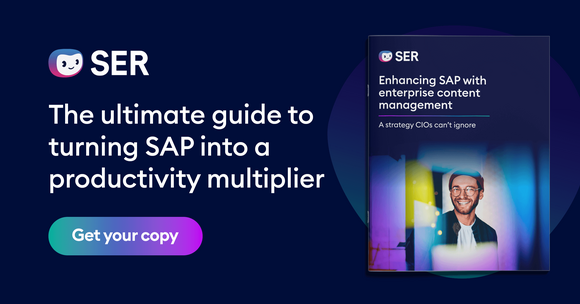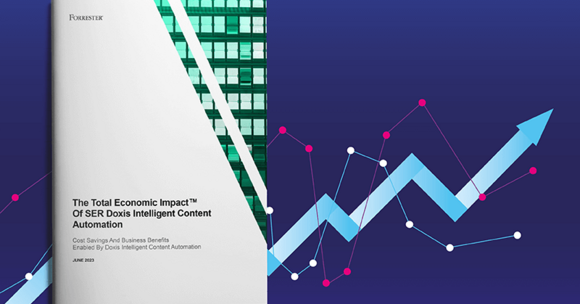SER Blog Information Governance
Compliance with DMS: More than risk management
Legal compliance is a must when processing, storing and deleting information – it is the only way to avoid violations, e.g. of the EU GDPR or trade secrets laws. However, implementing an information governance strategy and ensuring compliance with a wide range of regulations can cause additional expenses in your organization. While you have the security of avoiding major fines or costly audits, compliance measures in themselves are not boosting your revenue figures. At a second glance, however, compliance measures pay off in different ways.

Organizations recognize, of course, the importance of practicing information governance and ensuring compliance. For one, they help to avoid sanctions or operating bans. The proper handling of personal data is assured. When the auditor comes knocking, they can demonstrate audit-proof archiving and compliance with legal retention periods and regulatory standards. In addition, a company’s image can be deeply impacted by, e.g., compliance violations, which can lead to the loss of customers or orders. In spite of this, many companies are still lagging behind when it comes to compliance: The manual effort involved is so significant that they prefer to take the risk. It doesn’t have to be this way. There are solutions that make it easier to manage information securely. One of these is a document management system. With a DMS, you automatically lay the foundation for compliance with a wide range of legal regulations, without any additional effort. Quite the opposite, actually: When you digitize your documents and the related processes, not only do you improve compliance and information governance, but you also increase the efficiency of your processes – and maximize your profits.

Why investing in a DMS pays off
Find out more about how a DMS can support you in your compliance measures and offer other benefits for your entire company – including practical checklists and decision-making guides for choosing a DMS.
Read nowComply with legal retention periods, improve access to information
Invoices, contracts, order confirmations, annual reports: You are required by law to archive tax-relevant data and documents for statutory retention periods lasting several years. In basement or off-site archives, costs can add up in terms of floor space and hours spent searching for documents. In a DMS, on the other hand, all information is accessible digitally and can be used immediately from anywhere. This saves on costs for physical storage space, and your employees can use the time for tasks more valuable than searching for and filing documents. Access restrictions and logging of all access, changes and deletions ensure that information remains protected and that no violations occur.
A document management system that meets these requirements archives the relevant documents in an audit-proof manner and – as specified by laws for electronic recordkeeping, electronic archiving and fiscal codes – does so completely, making them always available in readable and machine-readable formats. This ensures that you are complying with regulatory requirements and that you can provide evidence thereof to the tax office and auditors.

EU GDPR-compliant document management
Compliance and retention rule settings are key in HR management. This video shows you how to set up retention rules to ensure automatic EU GDPR compliance.
Watch nowProtect data privacy & optimize processes
Even though the EU GDPR has now been in effect for almost two years, many organizations still haven’t implemented the requirements, or at least not fully. More than one-third of decision-makers surveyed in SER’s ECM Insights study from 2019 admit that they cannot yet foresee whether they are able to meet all of the requirements. A good DMS enables you to find personal data throughout the entire company, to flag it and protect it in accordance with EU GDPR. In Doxis, this is carried out using cognitive services that deploy artificial intelligence to detect, classify and accordingly store, protect and/or delete, if necessary, personal data. This applies not only to documents in the DMS but also to documents and data from business applications, e.g. in SAP. It enables all personal data to be stored securely, access to it controlled, all reviews and changes documented, and data deleted verifiably upon request – and all of this without significant manual effort.
With an intelligent DMS, you can optimize other processes in addition to ensuring data privacy: For example, you can automatically find employees with free capacities, thus making better use of teams and reducing throughput times. Proactive suggestions for content, experts or decisions make case processing even easier and more productive for employees, and ensure quality standards can be complied with more easily. This will be clearly evident in your customer service, process quality and, ultimately, sales.
Business process auditing
To meet different compliance requirements, businesses have to document which employees access and change documents, what decisions are made, and where and when approvals are issued. Companies in heavily regulated sectors are particularly affected, such as financial service providers or companies in the food and pharmaceutical industries. They must be able to prove demonstrably to independent auditors and authorities their compliance with applicable documentation requirements at all times. Procedural documentations can also be a critical area of legal compliance and governance. A document management system can help you ensure compliance with the relevant requirements by seamlessly and transparently documenting the entire process automatically ̵ from creation, processing, verification and release of the documents through to distribution. This audit trail function is required for ISO certification and quality seals that, in turn, support tender processes and attract new customers. The investment in compliance also pays off here.
What counts when making a decision?
With a suitable DMS, it is not only easier for you to meet compliance requirements, reduce the effort involved, and avoid penalties: With compliant digital document management, you also provide the foundation for increasing your process efficiency and thus working more economically. For this to work, you should make sure when selecting the software that the DMS does the following:
• meets the legal requirements, standards and guidelines that apply to you
• fully supports and can protect data from systems such as SAP and Microsoft
• holds certifications that give you the security of being able to demonstrate compliance to financial and tax auditors, appraisers and lawyers at all times
• has workflows and cognitive services that you can use to control documents intelligently and automatically and thus increase productivity
A comprehensive approach to compliance
Meeting compliance requirements is a company-wide matter: information stored throughout the company must be protected, processed verifiably, stored in an audit-proof manner, and deleted in accordance with EU GDPR. Businesses that rely on individual solutions for this, however, increase the amount of effort involved and risk of compliance violations. For example, if there are documents in a departmental archive for accounting, contracts are in a separate contract management solution, and requests from customers are located in a separate DMS, you have to maintain access protection and authorizations in three separate ways. It becomes easier when you protect all of your information with a standardized, company-wide solution. With Doxis you can set up authorizations and legal holds for all documents, files and processes centrally. Changes are also made, e.g. in the event of stricter access protection, so that no information can be forgotten. At the same time, such a company-wide solution ensures that you can find and delete all the relevant information immediately, e.g. if the right of erasure is evoked. Doxis documents all of this directly: accesses, changes and deletions are logged automatically, as are changes to authorizations and roles. You don't need an additional solution for documentation. With this comprehensive approach, you can reduce the effort involved in complying with and verifying regulations, and you can be confident that there are no gaps in your compliance and information governance strategy. Not only does this make audits far less stressful, it also provides you with solid, traceable proof in the event of litigation.
The latest digitization trends, laws and guidelines, and helpful tips straight to your inbox: Subscribe to our newsletter.
How can we help you?
+49 (0) 30 498582-0Your message has reached us!
We appreciate your interest and will get back to you shortly.




